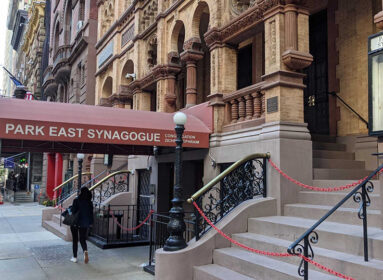Kulanu closes in Stamford
After a 10-year run, Greater Stamford’s after-school Jewish-education program for students in grades 8 through 12 is winding down.
A program of the Bureau of Jewish Education of the United Jewish Federation of Greater Stamford, New Canaan and Darien, Kulanu was funded by the Benson Zinbarg Kulanu Memorial Fund of the Jewish Community Endowment Foundation, area congregations, and private donors. Kulanu was a member of NAACHHS, the North American Association of Community Hebrew High Schools.
When enrollment began to drop off in 2012, the UJF board launched a two-year study of the program. In April, board president Shoshana Dweck announced in the UJF’s New Jewish Voice that this academic year would be Kulanu’s last.
“The good news is that, in our community, Jewish teen engagement has never been higher – both in terms of the number of children involved and the number of actual opportunities available to them, including synagogue programming,” Dweck wrote. “However, Kulanu is no longer where most of our teens choose to go.”
As a result of these findings, the board voted to not recruit new students this academic year, but instead to lend more support to other existing community teen programs and help institutions, synagogues, and schools create new opportunities. Kulanu students enrolled last year are allowed to remain for the current year; they and all area Jewish teens can consult with Danielle Alexander, UJF’s director of Jewish education and engagement, for individualized educational opportunities.
UJF will continue to run and expand other teen programs, including the Teen Leadership Council; Speak Up for Israel, in partnership with the Stamford JCC; and the Kuriansky Teen Tzedakah Corps, as well as March of the Living for 11th- and 12th-graders.
Maimonides Early Education closes in Ridgefield
In 1977, the Jewish communities of western Connecticut celebrated the opening of the first and only day school in the region. Led by communal leaders Dr. Alvin Goldman, Abraham Golub, and Cary Wellington, Maimonides Academy started out in the basement of Congregation B’nai Israel in Danbury with 13 nursery school and kindergarten students. Seven years after its founding, in 1984, Maimonides moved to its own campus on Miry Brook Road in Danbury. Over the next 25 years, the school grew to accommodate students through 5th grade.
With the 2008 economic downturn, many day schools began to see a decline in enrollment, and Maimonides was no exception; by the 2010 academic year, the student body had dropped to 50. The board of trustees decided to sell the Maimonides property to the neighboring Wooster School and lease back the campus and two buildings while seeking a new home.
Even as enrollment continued to decline, the school’s board and other involved parents decided that Jewish education was important for the community. In September 2011, Maimonides returned to its academic roots as an early-education program and relocated to Temple Shearith Israel in Ridgefield, with 15 students and five teachers.
Since then, the school grew by 10 students – of all backgrounds – but enrollment and fundraising were challenges from the start, says longtime board member Art Jureller, who served as president over the last academic year. By fall 2013, with only a nursery school, MEE faced an added difficulty: accreditation by the Connecticut Association of Independent Schools, which had been carried over from Maimonides Academy, was about to expire. To be considered for reaccreditation, the school would have had to reestablish a kindergarten – a high hurdle in a community with several private kindergartens – and replace the teachers who didn’t hold master’s degrees.
Jureller says that he and fellow board members were surprised at the lack of interest MEE generated in the Jewish community, among parents and synagogues alike, who saw the school as intended only for Temple Shearith Israel congregants – even though none of the students came from member families.
Rather, “every parent was there for the education,” Jureller says. “The essence of the school came from the quality of the education and the people delivering it. The Maimonides we knew was going to change dramatically, and the entire board felt that that was not what we were there for.”








 Southern New England Jewish Ledger
Southern New England Jewish Ledger









